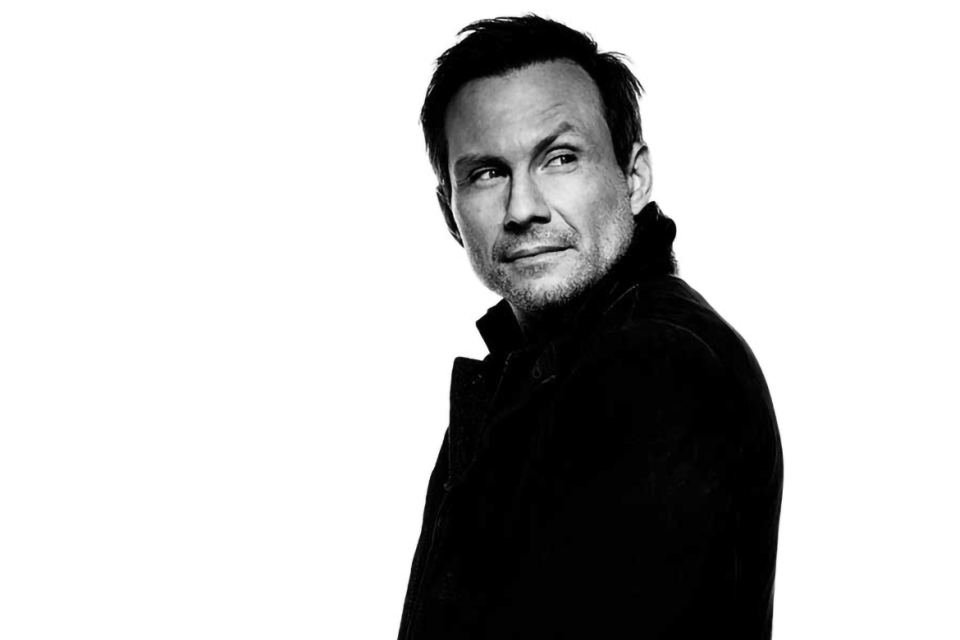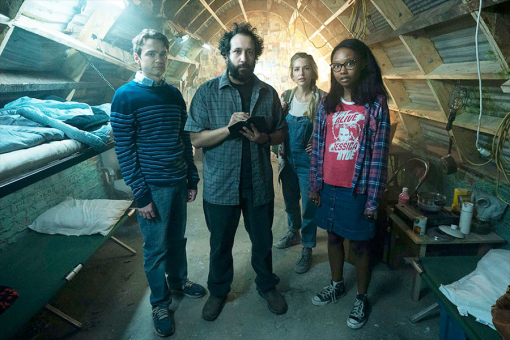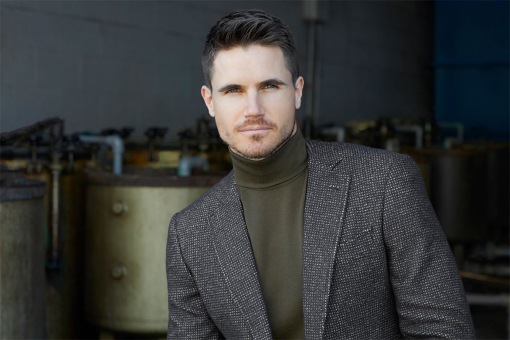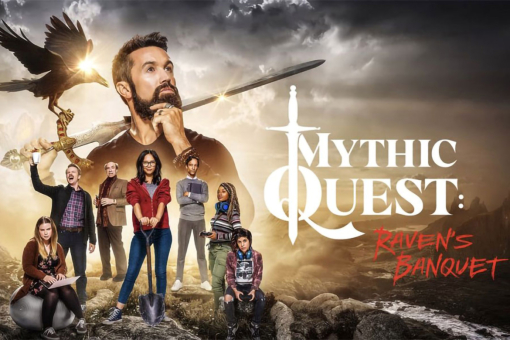It’s a brave new world for Christian Slater.
The Golden Globe-winning, veteran actor has played everything from slacker peace officer, to Will Scarlett, to outlaw cowboy. But it’s his dual role as Mr. Robot and Edward Alderson, in Sam Esmail’s USA drama, Mr. Robot, that has Slater excited, intrigued, and surprised all at the same time.
Mr. Robot centers on the brilliant activist/hacker, Elliot Alderson (Rami Malek), the newest recruit of the fsociety, a hacking group led by the mysterious Mr. Robot. Elliot suffers from a social anxiety disorder and is prone to paranoia and hallucinations.
The first season slowly revealed that Elliot himself is Mr. Robot, and that the man he believed to be Mr. Robot was actually a series of hallucinations based on the memories of his father, Edward.
“I read the pilot and called my agent to say, “This is very interesting.” It certainly was unexpected,” said Slater. “You know, when you get a script called Mr. Robot, you’re not exactly sure what it’s going to be about or who this character is. It went off in directions that I didn’t anticipate and that got me very excited.”
Looking at the roles you’ve played over the years in films like Heathers, Pump Up the Volume, Young Guns II, and in Robin Hood: Prince of Thieves, and now in Mr. Robot, it seems that you might be attracted to these characters that are anti-establishment or are agents of change.
You know, it’s not a set out or specific, particular plan. I started [acting], and I guess Heathers was really kind of the first character I played that really had some notice. Certainly that character, Jason Dean, out of the box, was off-base, offbeat, certainly was anti-establishment and was rebelling against the system.
The next script I think I read after finishing [Heathers] was Pump Up The Volume. I remember loving that script and the character.
I don't even know if I fully understood what all of the messages were in that particular movie at the time, and exactly what it was saying. I think it was certainly a project that was a bit ahead of its time in a lot of respects. It was looking to tackle “establishment issues” and fighting against the system.
And I’ve heard people describe Mr. Robot in a certainly very similar kind of fashion. The charm of Pump Up the Volume was that it was made at such an early stage of [audio] technology. I had to operate a ham radio, and now, it’s so wild, the stakes have certainly gotten much greater, and the technology has improved to such phenomenal levels that anything is possible.
I’ve definitely seen that there’s a similar parallel there. But as far as it being intentional, Heathers kind of established a bit of the rebellious personality, and I think directors, producers, and writers at times have seen me in that particular way. Meanwhile, I’m a pretty mild-mannered guy.
It was revealed at the end of the first season your character wasn’t “real,” but was instead an aspect of Elliot Anderson’s personality based on the memories of his father, Edward. At what point in filming did you discover the truth about Mr. Robot and Edward?
I had some suspicions about the character from the beginning. I sat down with Sam Esmail immediately and I asked him what the deal was with the character and he asked if I really wanted to know.
I did and he told me the character’s backstory, what his relationship to Elliot was, and it surprised me. The fact that Sam Esmail had thought [the series] through the way that he had just got me. I was just thrilled.
So you knew from the pilot stage?
Yeah, yeah I did. I was let in.
Since your character is based on his memories of you, were you mimicking Elliot in any way? Or were you trying not to act like him?
I think as we’ve gone along it’s gotten clearer and clearer for me that I’m as real as Elliot imagines me to be. That’s been my interpretation. He totally, utterly believes that another human being is there. It’s an interesting psychological journey, but I absolutely played it as real and as present as I could.
What was really fascinating for me was going back and getting the opportunity to do some of the flashback scenes. Those were great because it gave me the opportunity to play two different people.
One was the idealized image of what Elliot hopes how his father would be, the leader of this very small and powerful group, who’s very mysterious, smooth talking, seductive, manipulative, and extraordinarily powerful.
The reality is that he was really just a guy trying to get by, take care of his family, who was dealing with sickness, and with all of the human travails that we all have to deal with on a daily basis. He’s vulnerable, clumsy, and human. So that was great.
It was also great that Sam was there 98 percent of the time in the first season. I had been going along playing this mysterious, intriguing, fun character and when it came time to shooting those flashback scenes, it was just sort of instinctual for me to keep kind of going in that direction.
Sam came in and said, “Listen, you are not Mr. Robot now, you are Edward Alderson. You are human being” That gave me so much to work and play with.
Were you playing a father or were you playing a memory?
There definitely were aspects of that. First of all, I was incredibly grateful that Sam had been as open as he was about Elliot and Mr. Robot’s relationship.
If he had revealed that to me later on, I think we would have missed some opportunities there. Having that information played into the compassion that I had for my son over the struggle that he’s going through. It played out in certain looks and just being a little more sympathetic toward him.
If I were just some sort of imaginary character that he made up and didn’t have that relationship with him, it would have been a much more of a surface type of situation. The relationship between a father and son is certainly deeper and a lot more meaningful than it would have been otherwise.
Did the other actors know the secret about your character and how to navigate around you?
Some of the actors knew, and some didn’t. I would have fun with that. If I ever asked somebody a direct question and they would answer me I would immediately say, “Hey, man, I’m not really here.” I’d kind of goof on Romero (Ron Cephus Jones) and on Mobley (Azhar Khan).
What was fascinating was that sometimes the crew would even get a little suspicious about it. They weren’t let in on the secrets and would come up to me to say interesting things like, “Hey, it didn’t look like anyone was paying much attention to you in that scene. How did that feel?”
It was one of those types of situations even on the set where we had to hold our cards really close and I couldn’t really reveal anything even there.
Was the secrecy well in place from the beginning?
Yes! When it finally came to us shooting episode 9 where all those secrets were revealed and all of that information came out, it actually was great, not only for [the cast], but also for some of the guys on the crew.
The fact that the relationship went deeply into the father-son aspects really affected a lot of the guys that we were working with. They would come up to me to talk to me about their relationships with their fathers, and some of them were genuinely moved. I realized that this was something that was very unique.
What are your thoughts looking back on the first season?
I was so mesmerized by Rami’s performance and just sort of drawn in by what he’s able to do. The writing is pretty remarkable. The cinematography by Todd Gamble is just unbelievable. The music is just right.
When something comes together like this it’s so unique. It doesn’t happen all the time. We all feel extraordinarily humbled and thrilled and proud and certainly grateful to be a part of it.
Did you have a favorite scene from Season One?
The first day that I met Rami I really liked him. I felt like there was something very special about him. He’s a really nice and humble guy. The first scene that we actually shot was on a Ferris wheel, where it was just the two of us in a cage at Coney Island.
We were doing this eight-page scene together and that was kind of the perfect way to start off. It was a good foundation. We got to kind of build from there and continue to get to know each other. We found out that we work in very similar ways, and that we take the job seriously but we don’t really take ourselves too seriously.
Now that the secret is out, are you afraid that your character has lost his purpose in the series?
(Laughs) You know what, I certainly had similar questions and concerns about that. I didn’t know where we were going to go after the pilot, honestly.
That’s the thing about Mr. Robot, I never know where the show is going to go. I love playing the character and had such a great time on Season One. The fact that we got to come back and do Season Two is extraordinary and very exciting.
Now as for what happens between Elliot and Mr. Robot, where their relationship goes, I’m just feeling excited for people to see that.
This is a very intense [series]. The show is all about technology and where we are today, and how technology influences our lives. But there is such a human story that’s also psychological.
Elliot’s character really has to go through some serious difficulties and some major struggles and I think it’s going to continue to be a heartbreaking at times, and very powerful exploration of somebody’s psyche.
For more on Mr. Robot, click here.











